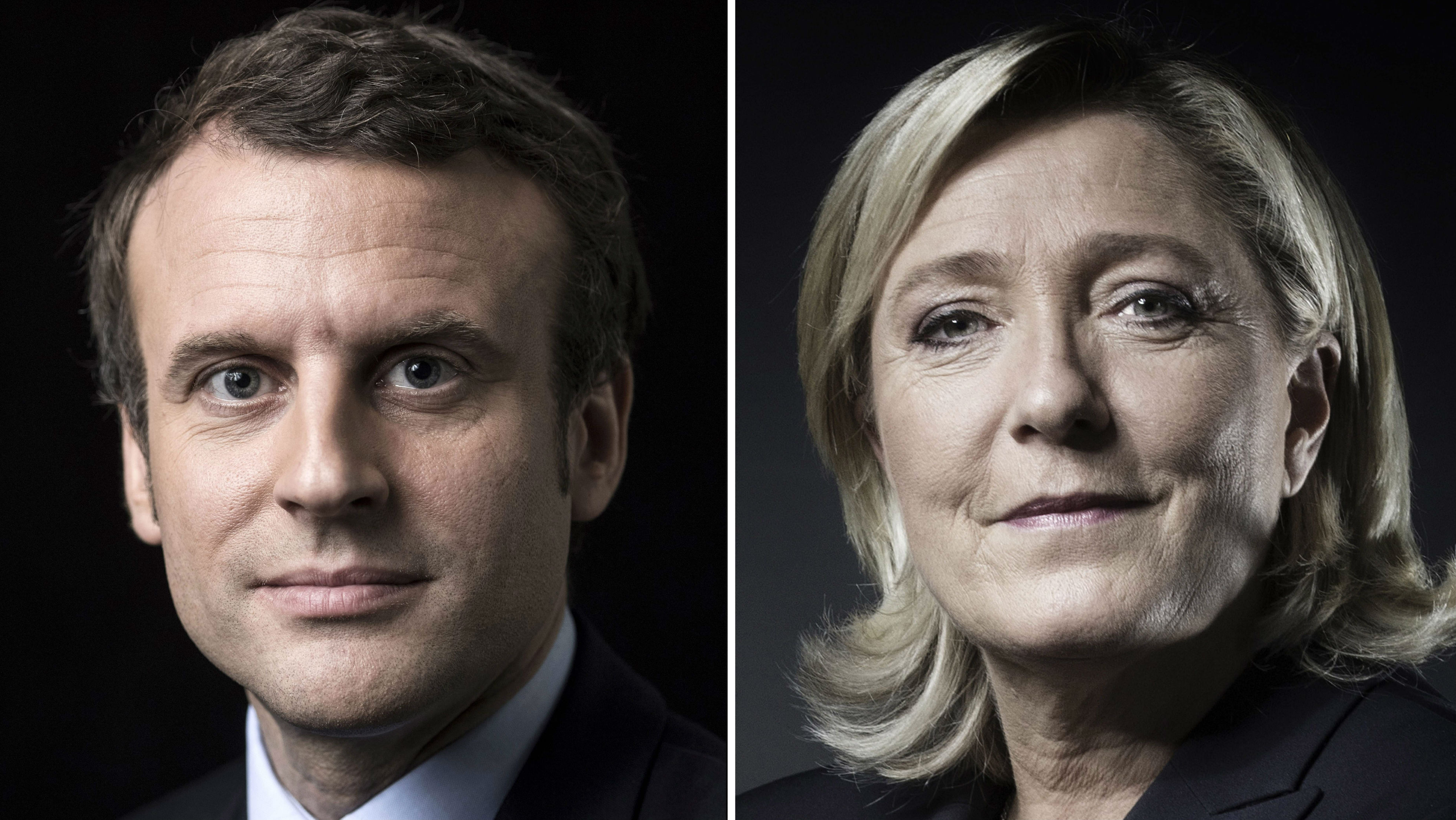Macron vs Le Pen: Where do they stand on key issues?
As France prepares to choose its next president, here are the key differences between the two candidates

A free daily email with the biggest news stories of the day – and the best features from TheWeek.com
You are now subscribed
Your newsletter sign-up was successful
France elects its next president this week and the two candidates on offer could scarcely be more different.
Sunday 7 May will see voters choose between centrist Emmanuel Macron and far-right Marine Le Pen. Here is a run-down of the two hopefuls' policies.
European Union
The Week
Escape your echo chamber. Get the facts behind the news, plus analysis from multiple perspectives.

Sign up for The Week's Free Newsletters
From our morning news briefing to a weekly Good News Newsletter, get the best of The Week delivered directly to your inbox.
From our morning news briefing to a weekly Good News Newsletter, get the best of The Week delivered directly to your inbox.
Macron: A Europhile who wants to rejuvenate the eurozone, giving it a separate budget and finance minister, German newspaper Handelsblatt reports.
Says the EU needs to listen to people's anger and reform or face a "Frexit", the BBC writes, but also wants more integration on fiscal, social and environmental regulation and to launch a campaign against anti-EU sentiments in France.
Le Pen: Wants to ditch the euro, although she has toned down the rhetoric as she tries to build out her power base, CNN says.
Also wants to renegotiate the EU's border-free travel and budget contributions. If not, she promises to hold a "Frexit" referendum on a complete withdrawal from the bloc, reports the Financial Times.
A free daily email with the biggest news stories of the day – and the best features from TheWeek.com
Immigration
Macron: Has praised Angela Merkel's move to open Germany's doors to refugees and would prioritise resolving asylum requests within six months, Reuters reports.
"Other" asylum-seekers would be deported home immediately.
Le Pen: Wants to slash immigration by 80 per cent to 10,000 people a year, according to the Financial Times, and has said she would suspend all legal immigration immediately.
Protectionist policies would see taxes on employers who hire foreigners and make it harder for outsiders to become French citizens.
Labour and Welfare
Macron: Says public spending would be cut by €60bn (£50bn) annually and government employees reduced by 120,000 by not replacing those who retire. But would also spend €50bn (£42bn) over the five-year term on sectors such as energy and agriculture.
Le Pen: Wants to cut the lowest income tax rate, lower the retirement age and maintain France's 35-hour working week. Would extend welfare benefits for the working class.
Business & trade
Macron: Wants to double down on free trade and campaigned for Ceta, the EU-Canada trade deal.
Would gradually shrink corporate tax rate to 25 per cent from the current 33, CNN reports.
Wants an EU mechanism to control foreign takeovers of key industries, the FT says.
Le Pen: Protectionism would see new foreign trade barriers, no new free trade agreements and French companies granted priority on public contracts.
After France left the euro, she would take control of the central bank and get it to print more money to cut debt, Bloomberg reports.
Defence
Macron: Would boost defence spending to two per cent of GDP in line with Nato's benchmark.
Pro-Nato but, according to the BBC, wants to boost Europe's defence capabilities, partly because of Donald Trump's ever-shifting stance towards the alliance.
Le Pen: Agrees with Trump that Nato is "obsolete" (although the US President has since embraced the organisation) and would pull France out, the Daily Express reports.
Would boost defence spending to three per cent.
-
 6 of the world’s most accessible destinations
6 of the world’s most accessible destinationsThe Week Recommends Experience all of Berlin, Singapore and Sydney
-
 How the FCC’s ‘equal time’ rule works
How the FCC’s ‘equal time’ rule worksIn the Spotlight The law is at the heart of the Colbert-CBS conflict
-
 What is the endgame in the DHS shutdown?
What is the endgame in the DHS shutdown?Today’s Big Question Democrats want to rein in ICE’s immigration crackdown
-
 Epstein files topple law CEO, roil UK government
Epstein files topple law CEO, roil UK governmentSpeed Read Peter Mandelson, Britain’s former ambassador to the US, is caught up in the scandal
-
 Iran and US prepare to meet after skirmishes
Iran and US prepare to meet after skirmishesSpeed Read The incident comes amid heightened tensions in the Middle East
-
 Israel retrieves final hostage’s body from Gaza
Israel retrieves final hostage’s body from GazaSpeed Read The 24-year-old police officer was killed during the initial Hamas attack
-
 China’s Xi targets top general in growing purge
China’s Xi targets top general in growing purgeSpeed Read Zhang Youxia is being investigated over ‘grave violations’ of the law
-
 Panama and Canada are negotiating over a crucial copper mine
Panama and Canada are negotiating over a crucial copper mineIn the Spotlight Panama is set to make a final decision on the mine this summer
-
 Why Greenland’s natural resources are nearly impossible to mine
Why Greenland’s natural resources are nearly impossible to mineThe Explainer The country’s natural landscape makes the task extremely difficult
-
 Iran cuts internet as protests escalate
Iran cuts internet as protests escalateSpeed Reada Government buildings across the country have been set on fire
-
 US nabs ‘shadow’ tanker claimed by Russia
US nabs ‘shadow’ tanker claimed by RussiaSpeed Read The ship was one of two vessels seized by the US military